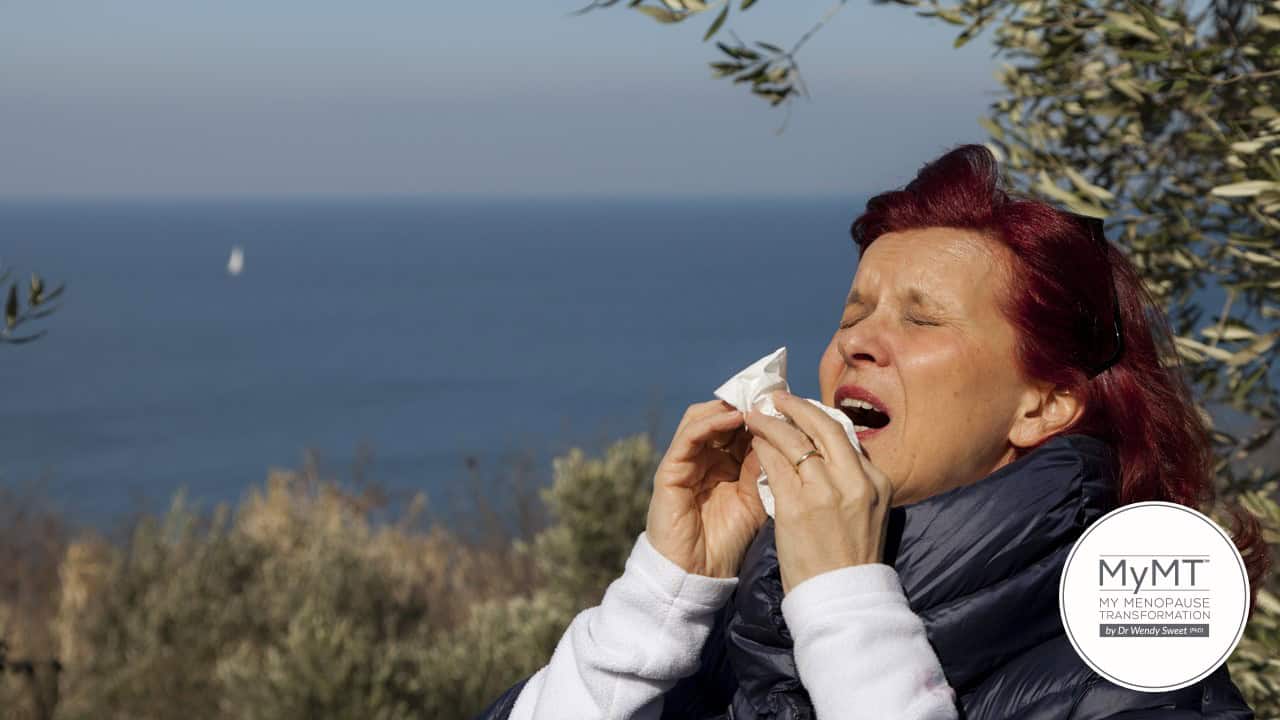Did you realise that there are various lifestyle solutions that are evidenced to improve your sleep, reduce your hot flushes, improve your sore joints and muscles and of course, help your changing moods?
I’m always explaining to women on my coaching programmes, that when we position our menopause transition in women’s healthy ageing research, it takes away the confusion of how to move through menopause and turn back time on inflammatory changes that arrive during this important stage of life.
As my doctoral studies allowed me to explore one of the main theories of ageing, the Inflammatory Theory of Ageing, this opened up my mind to new possibilities as to how to manage my day-to-day life – I hope that you can do the same because looking at how our body gathers inflammatory changes during our menopause transition and then exploring how to reduce these changes throughout the body is a new way to look at your menopause symptoms, including your weight.
Low-grade chronic inflammation underlies many chronic systemic diseases, especially age-related decline and metabolic disorders.
I’ve talked about these age-related changes numerous times in other articles, [which you can always access on my blog page on the website], but this is a reminder that our mid-life menopause transition is a vulnerable time for changing levels of inflammation.
Increasingly, research is showing that peri-menopause is viewed as a systemic inflammatory phase that enables later neurogenerative (nervous system) and cardiovascular disease (McCarthy & Raval, 2020; Furman, Campesi et al, 2019).
At the level of basic biological processes, healthy ageing is defined as ‘fending off cellular and molecular damage for the longest possible period of the life course‘ (Bengtson et.al, 2009). How we do this is through understanding that inflammatory changes arrive as part and parcel of our transition through our mid-life years, therefore, how we mitigate this (or turn back the clock if inflammatory changes have already arrived), is an important aspect of our day to day behaviours and routines.
In most chronic diseases of ageing, oxidative stress and inflammation play prominent roles.
Oxidative stress is a phenomenon caused by an imbalance between production and accumulation of damage in cells and tissues and our ability to detoxify and reduce the inflammation. When we can’t reduce the inflammation, then, as many of you know, this builds up over time and we start to experience symptoms that are hard to get rid of. During menopause these symptoms often present as hot flushes, night sweats, thyroid, gut health and joint problems, depression and more!
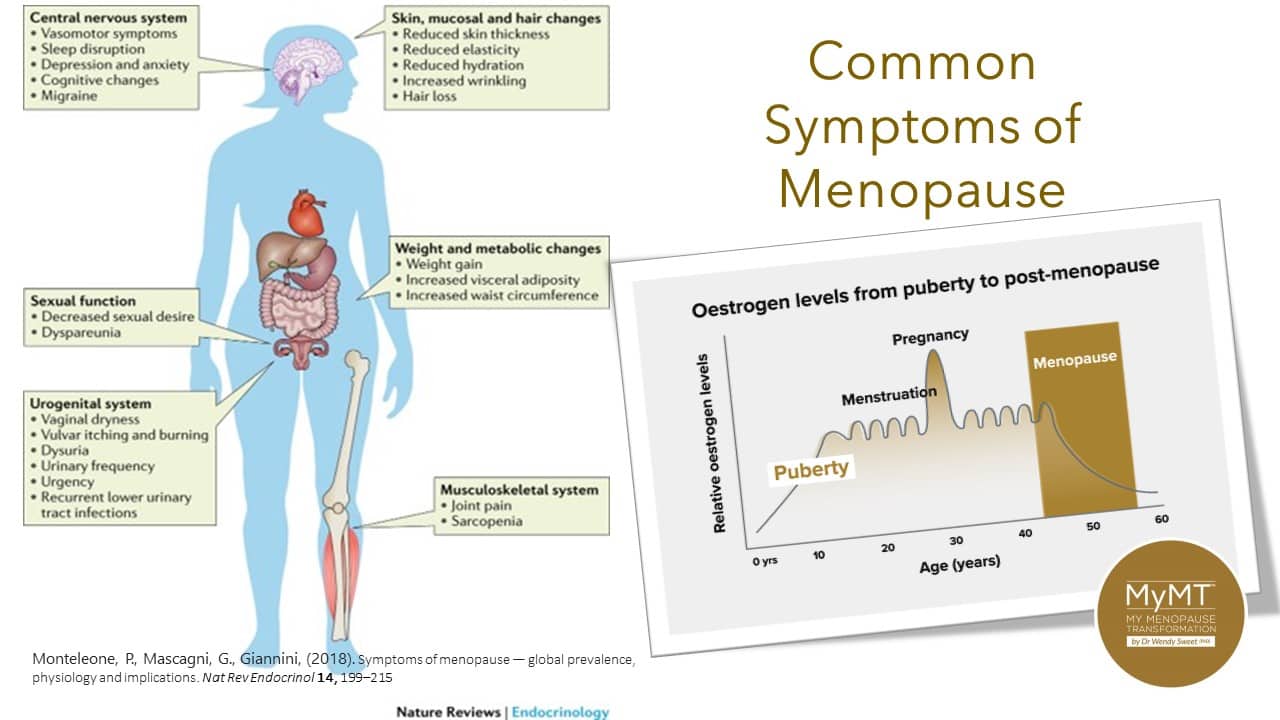
Our menopause transition is a new beginning for all of us and for women in menopause who might be struggling with worsening health, then it’s time focus on changes to your health. Because as the saying goes, ‘If you keep doing the same old things, you will get the same old results.’
When my own health changed so much during my early 50s, I had to change my beliefs about how to look after myself, especially when nobody else had the answers I sought, I used my women’s health and ageing research to explore the lifestyle medicine evidence.
Doing this opened up an entirely new way of understanding about how to change my lifestyle in order to match my new hormonal environment. I hope my numerous articles, have helped you too, especially if you’ve struggled with your health and your feelings of stress and overwhelm over the past couple of years, with the arrival of the pandemic.
Many of you may also still be suffering from fatigue and long covid symptoms, so exploring how to reduce inflammatory changes and fatigue is even more important for you than ever. If I were you, I would start with your Vitamin C intake. Your struggling immune system needs this powerful immune regulator. [Carr & Magini, 2017].
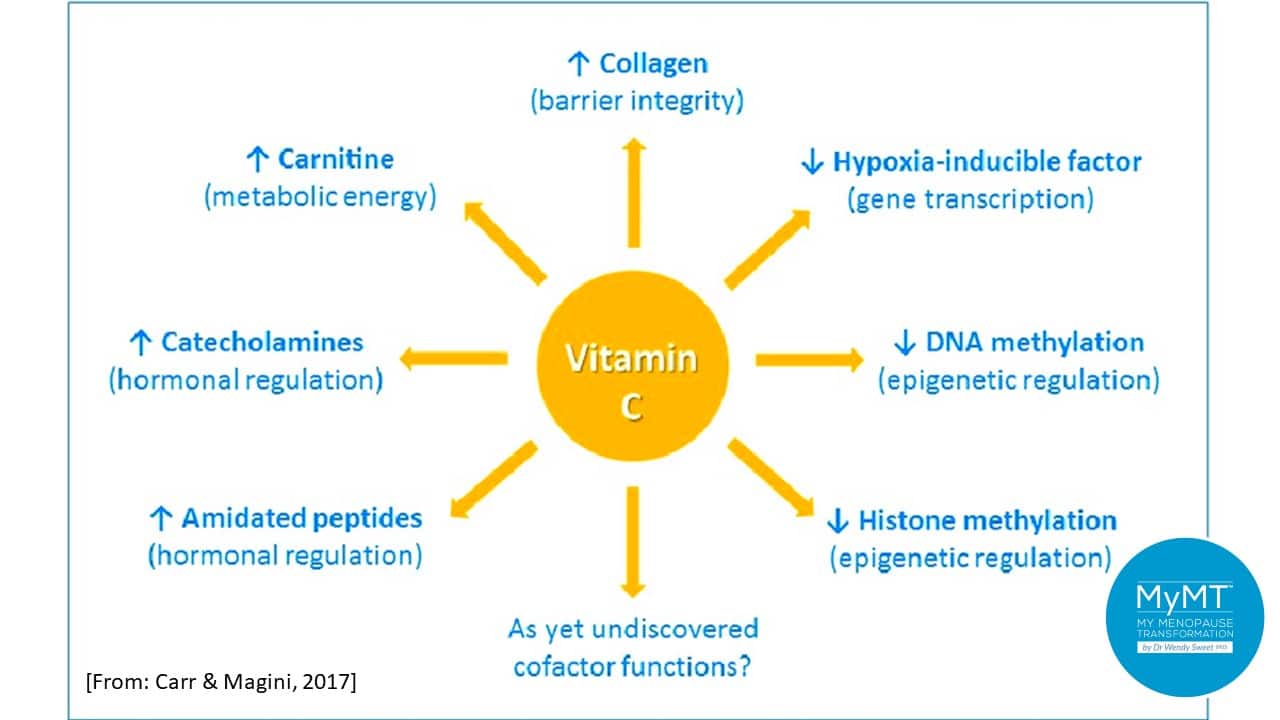
Inflammation resulting from a maladaptation of the immune system affects all organ systems in the body. Our menopause transition is a catalyst for this inflammatory advance.
If your joints and muscles are sore since you arrived in peri-menopause, or your gut health has changed and you’ve developed Irritable Bowel Syndrome (IBS), or you are feeling depressed and anxious or you are overweight, then these are all signs of chronic inflammation. We become more vulnerable to this inflammation sitting around when we can’t sleep.
It’s why, before any crazy diet or exercise regime that you might be thinking of undertaking, you need to sort out your sleep. I’m passionate about women sleeping all night. Without sleeping, your immune and cardiovascular health may struggle. Sleep is crucial to strengthening immunity but so too are other strategies, based on immune health research into the lifestyle changes we can make to move us towards improved health as we age. (Monye & Adelowo, 2020).
Lifestyle Factors to Strengthen our Immunity
- Sleep: There is an absolute improvement in the reduction of inflammatory markers when sleep disturbance, is eliminated. The researchers found this to be equivalent to the absolute positive changes associated with adequate aerobic exercise and healthy dietary interventions. This is why, changing our symptoms in menopause isn’t only about medications, diet or exercise. It’s about (re)establishing your circadian rhythm. It is well known that changing reproductive hormones impact our circadian rhythm, and it’s why my first webinar in all of the MyMT™ programmes is about your precious sleep – it’s that important to your immune health, your weight, as well as your hot flush frequency and duration.
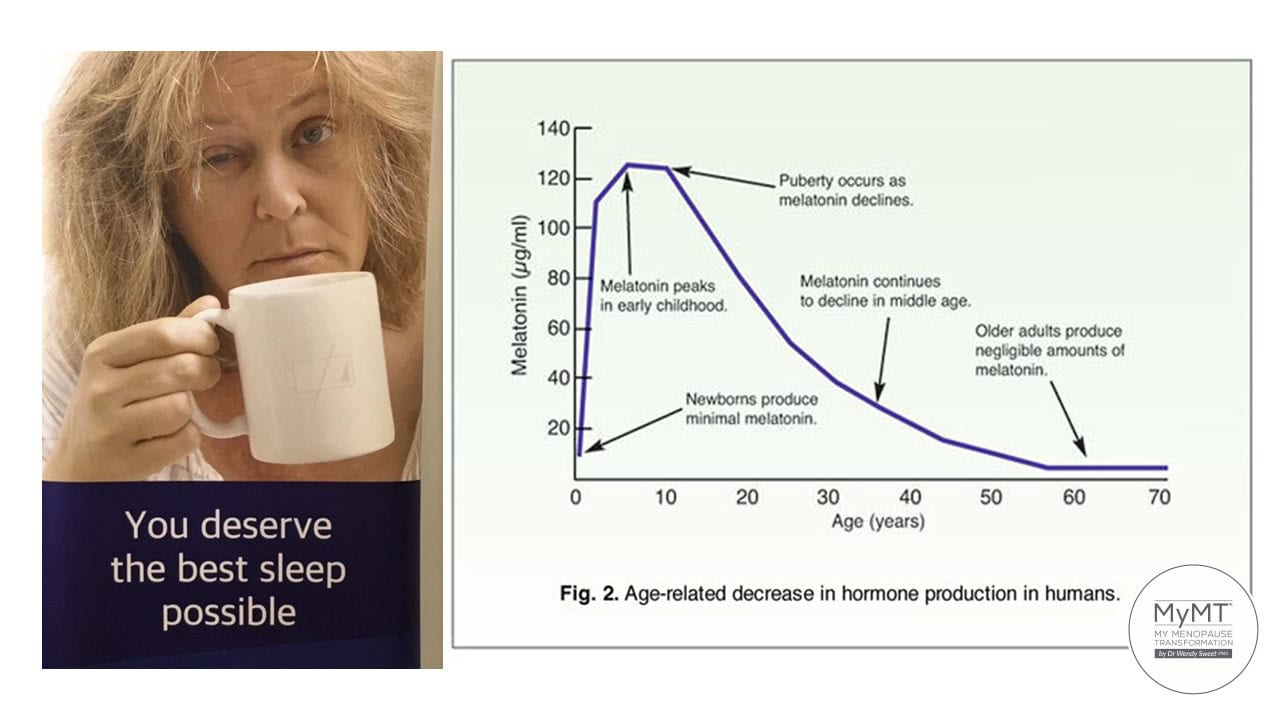
- Increase physical activity – but not too much. I’ve talked about moderate physical activity in numerous newsletters over the past year and why, when we aren’t sleeping or have joint and muscular pain and we are going through peri-menopause, then we need to back-off high intensity exercise.
There is clear evidence that the immune system responds to regular physical activity, with the extent and duration reflecting the degree of physiological stress imposed by the workload.
Whilst there is an emphasis on higher-intensity, short-duration exercise in the fitness industry, I know from my sport and exercise science lecturing, that doing too much of this type of exercise leads to over-training and worsening immune health, specifically, upper respiratory tract infections.
Many women are doing too much high-intensity exercise (and I include heavy weight training in this), but if they aren’t sleeping, then this is sending them into over-training mode, which then upsets the balance between oestrogen and progesterone in peri-menopause and menopause.
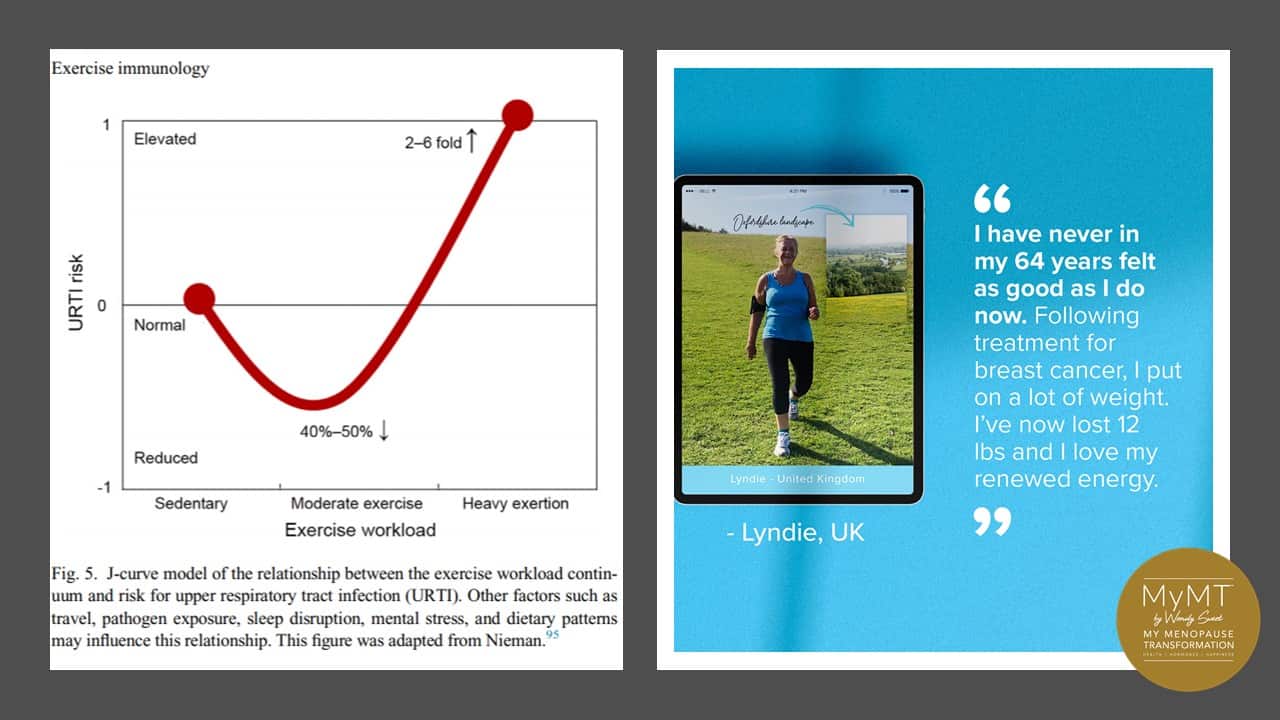
- Improve Gut Health. Studies have further elucidated that the direct viral infection of the intestinal mucosa in patients with the virus, may lead to gastrointestinal symptoms such as abdominal pain, nausea, vomiting, and diarrhoea. Researchers from the Hubrecht Institute in Utrecht, Rotterdam, Maastricht, the Netherlands, have found that the corona virus can infect cells of the intestine and multiply there. Improving gut health matters and I’ve written about why this is crucial to us in menopause HERE.
4. Improve Nutrition for immune health. Researchers know that immune cells need adequate supply of energy (from foods) in order to effectively respond to invading infections. If you are thin and under a lot of stress, then take note. You need to eat! If you are overweight and crave sugary, fatty, salty foods, then this is what you have to turn around. Both circumstances increase the risk of immune health changes as we age.
With the increased demand for energy during periods of infection and fever, researchers now know that the nutrients we need for our immune health include zinc, iron (except not too much iron in post-menopause which I’ve written about HERE), magnesium, Vitamin C, B12, Vitamin E and of course, amino acids from good quality protein sources. These amino acids help in the production of immune proteins and support the antioxidant defence mechanism, which is needed to limit tissue damage in viral infection.
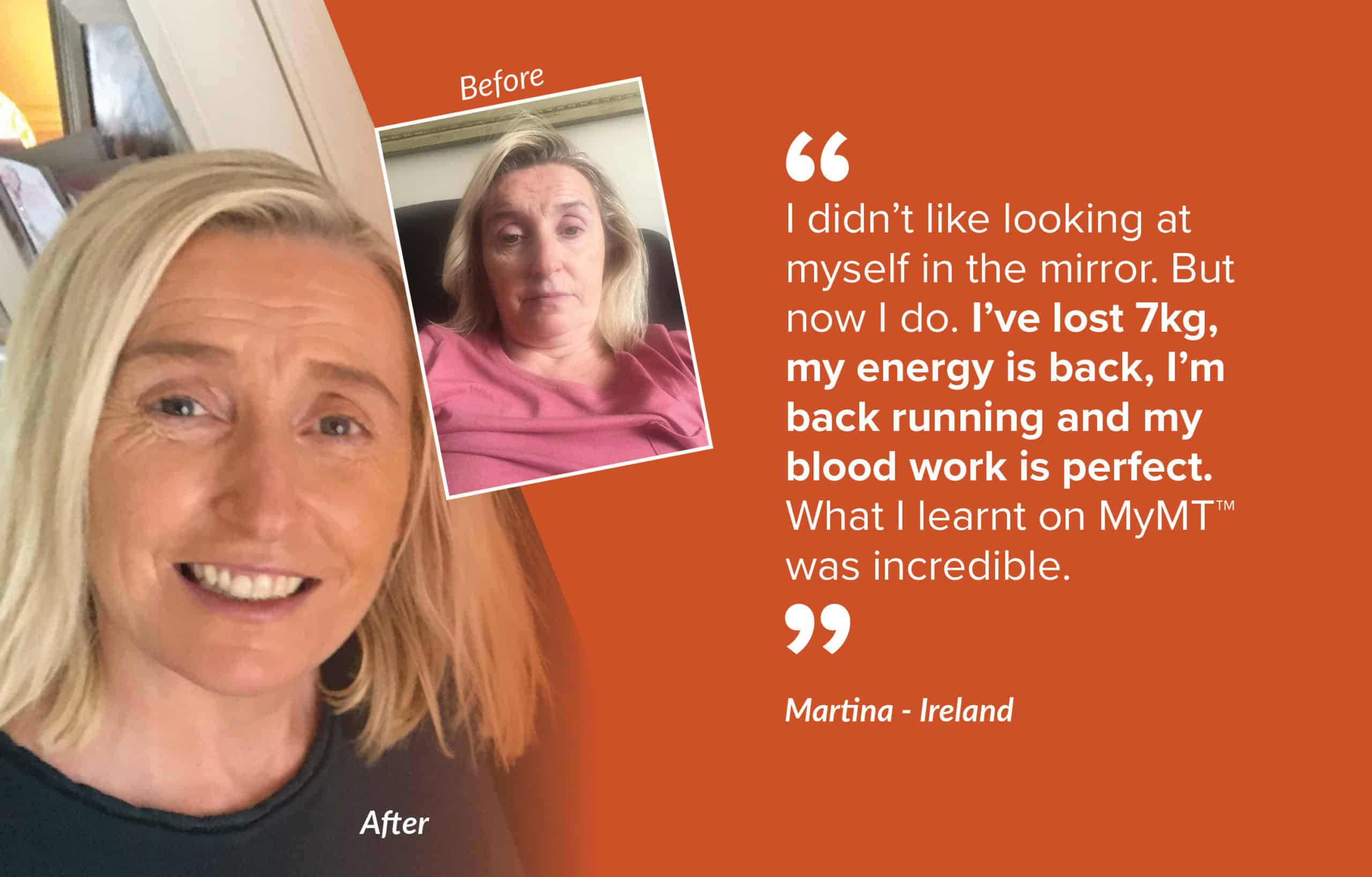
- Reduce or manage stress. I talk a lot about stress management and how to reduce our chronic stress hormone called cortisol, in the MyMT™ programmes. Our response to feeling overwhelmed and stressed during menopause impacts hugely on our immune health and our weight. For busy, active women with a lot going on in their lives this is crucial to being able to navigate symptoms in menopause.
The hormone that is usually released in response to chronic stress, cortisol, has been shown to have the potential to disrupt immune regulation and is specifically associated with increased proinflammatory cells that increase the duration of viral infections. It was such a privilege to help Dr Clare Wright understand this and why her weight was increasing, as she continues to support employees in the NHS in Wales. It’s been an incredibly stressful couple of years for her and others and I’m so pleased she came on the MyMT™ Transform Me weight loss programme.
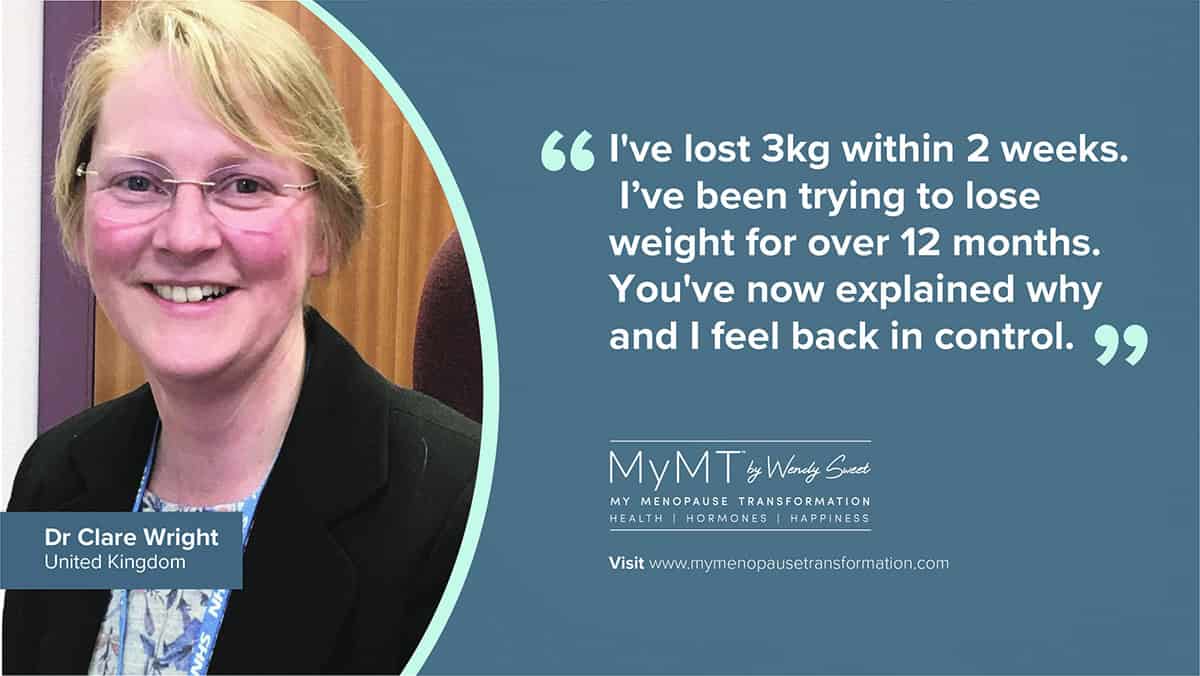
Changing our ways in midlife can be challenging. I know this myself. But as women have another 25-30 years of living ahead of them in their post-menopause years, I also believe that doing nothing about your health is no longer an option, hence, finding ways to progressively move forward to making small changes that are specific to our hormonal environment during menopause, is important.
When we take the approach that the past is behind us and we can only look ahead in the next phase of our lives, then we can make some changes to our health … as the saying goes, ‘It’s never too late!’.
That’s the purpose of the MyMT™ programmes for you. To help you to understand the lifestyle change strategies which are evidenced against women’s midlife and post-menopause. You learn what to do and most importantly, why you need to do it! Understanding ‘why’, helps you to turn your health intention into small, daily actionable steps.
No matter where you live in the world, you can come on board with me – it would be my privilege to help you to feel like your old self again. The video below is an outline of how the programmes work.
Dr Wendy Sweet, (PhD). MyMT™ Founder & Member: Australasian Lifestyle Medicine Society.
References:
Heckhausen J, Brandstätter V, Fishbach A, Freund AM, Lachman ME, Robert P. (2021). Goal Changes and Healthy Aging. J Gerontol B Psychol Sci Soc Sci., 13;76(Suppl 2):S105-S114.
Monye, I. & Adelowo, A. (2020). Strengthening immunity through healthy lifestyle practices: Recommendations for lifestyle interventions. Lifestyle Medicine, Vol. 1, 1-11. Wiley Publ.
Pizzino, G., Irrera, N., Cucinotta, M., Pallio, G., Mannino, F., Arcoraci, V., Squadrito, F., Altavilla, D., & Bitto, A. (2017). Oxidative Stress: Harms and Benefits for Human Health. Oxidative medicine and cellular longevity, 2017, 8416763. https://doi.org/10.1155/2017/8416763
Santoro N, Sutton-Tyrrell K. (2011). The SWAN song: Study of Women’s Health Across the Nation’s recurring themes. Obstet Gynecol Clin North Am. 2011 Sep;38(3):417-23.
Storz MA. Lifestyle Adjustments in Long-COVID Management: Potential Benefits of Plant-Based Diets. Curr Nutr Rep. 2021 Dec;10(4):352-363. doi: 10.1007/s13668-021-00369-x.
Vollbracht C, Kraft K. Feasibility of Vitamin C in the Treatment of Post Viral Fatigue with Focus on Long COVID, Based on a Systematic Review of IV Vitamin C on Fatigue. Nutrients. 2021 Mar 31;13(4):1154.
